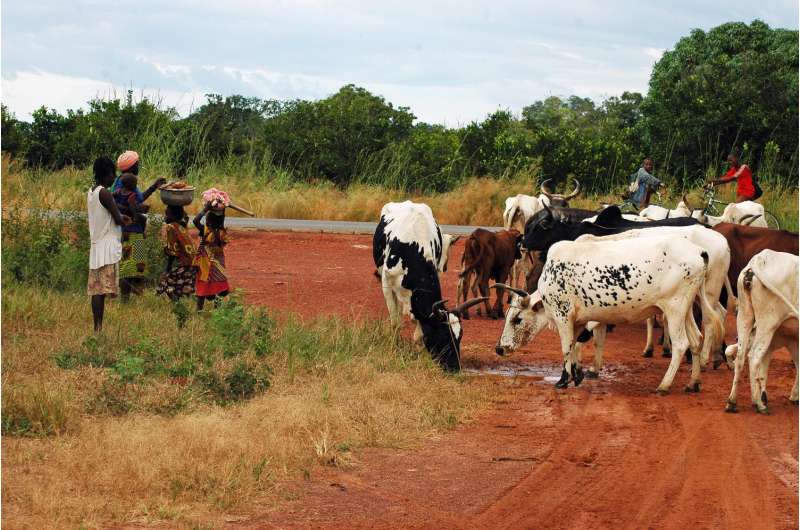A chromosome anomaly may cause malaria-transmitting mosquito to prefer feeding on cattle

Mosquitos are more likely to feed on cattle than on humans if they carry a specific chromosomal rearrangement in their genome, reducing their odds of transmitting the malaria parasite, reports Bradley Main at the University of California, Davis in a study published September 12, 2016 in PLOS Genetics.
Rates of malaria transmission depend on whether mosquitos bite humans or animals, and whether they rest after that meal in an area where they will encounter pesticides. Main and his colleagues investigated whether there is a genetic basis to host choice and resting behavior in Anopheles arabiensis, which has become the primary vector of malaria in East Africa, due to its broader host range, and the frequent use of pesticide-treated bed nets, which kill off other species that live in close association with humans. The researchers sequenced the genomes of 23 human-fed and 25 cattle-fed mosquitos collected both indoors and outdoors from the Kilombero Valley in Tanzania. They identified a genetic component that contributes to the mosquito's host choice, but not its choice of resting place. They narrowed down the gene region associated with cattle feeding to a chromosomal rearrangement called the 3Ra inversion. While the findings provide strong support that the inversion in An. arabiensis is linked to cattle feeding, researchers will need to perform controlled host choice tests across a larger geographic area to confirm the connection.
The study is the first to use genomic tools to find a genetic basis for earlier observations that inversions can be linked to a preference for cattle feeding in mosquitos. Using genetics to better understand and track mosquito behavior can be used to improve local control strategies. This knowledge may also open novel avenues for stopping malaria's spread, such as genetically modifying mosquitos to prefer cattle over people.
Bradley Main notes: "Whether there is a genetic basis to feeding preferences in mosquitos has long been debated. Using a population genomics approach we have established an association between cattle feeding and a specific chromosomal rearrangement in the major east African malaria vector. This work paves the way for identifying specific genes that affect this critically important trait"
More information: Main BJ, Lee Y, Ferguson HM, Kreppel KS, Kihonda A, Govella NJ, et al. (2016) The Genetic Basis of Host Preference and Resting Behavior in the Major African Malaria Vector, Anopheles arabiensis. PLoS Genet 12(9): e1006303. DOI: 10.1371/journal.pgen.1006303
Journal information: PLoS Genetics
Provided by Public Library of Science




















